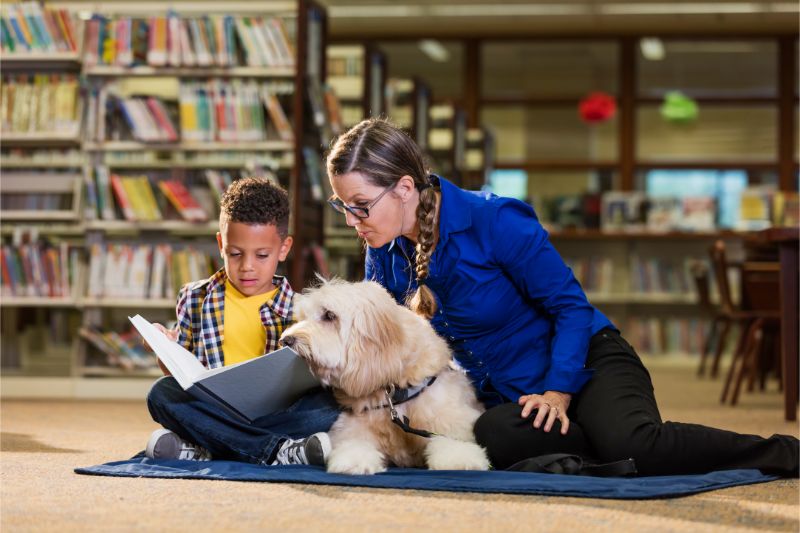Does Your Dog Have What it Takes to Be a Therapy Dog?

Do people routinely tell you how wonderful your dog is? If you are used to hearing “You have the best dog in the world!”, and you’re interested in sharing your dog with others who may benefit from your dog’s sweetness, perhaps you should consider therapy dog training! After all, what better way to spread the happiness and comfort that your dog brings than taking your sweet pup into a hospital or to a senior center where there are people who would appreciate a visit from a special four-legged companion?
Anyone who owns a dog knows how much this special bond adds to their quality of life, and there’s science to back it up. Recently, therapy dogs have been recognized by the scientific community for the health and healing benefits that they offer. Studies show that simply petting a dog stimulates the release of “feel good” neurochemicals, and contributes to lowered blood pressure, less depression, and an overall reduction in stress. There are numerous ways that therapy dogs can provide support, companionship, hope, and other health benefits to help people heal from both physical and psychological ailments.
What is a Therapy Dog?
Unlike a service dog, which is specifically trained to provide a set of services for an individual with specific needs, therapy dogs are trained to provide comfort and companionship for individuals who are in an institutionalized setting, such as a hospital or nursing home. Over the past several years, therapy dogs have become more common in other public places where people often need some cheering-up by a visit with a sweet and friendly canine.
Some examples of the amazing ways therapy dogs touch the lives of those they come into contact with include:
- Elevating the mood of patients in hospitals and nursing homes.
- Reducing anxious feelings in airports, schools, and other settings.
- Providing social and emotional support to individuals with a variety of ailments.
- Reducing the stress and anxiety that often accompany physical and mental disorders.
Therapy Dog Credentials
A dog of any breed or age can become a therapy dog, provided they have the right personality traits, are well trained, and consistently and reliably demonstrate exemplary behavior. Therapy dogs should be:
- Calm
- Reliably friendly towards strangers
- Well-socialized around children and adults
- Highly responsive to basic obedience commands
- Highly adaptable to new environments, noise, smells, and other novel stimuli
Most therapy dog organizations also require that dogs be in excellent health, fully vaccinated and undergo routine physical examinations with their veterinarian. They must also be clean and well-groomed at the time of their visits.
If you think your dog has what it takes to become a therapy dog, your team at Lone Tree Veterinary Medical Center has some suggestions on how to get started.
Team Training
Since there’s a lot more to becoming a therapy dog than just knowing that you have a great dog, it’s important to understand the requirements and steps involved. Now comes the serious preparation and team training, as it’s not just your dog entering into a hospital, nursing home, library, or school – you’ll be there, too – so you both need to be a well-functioning team.
- The first step for most therapy dog training protocols is for the dog to have gone through a basic obedience training class and graduated with flying colors.
- Next, comes taking and passing the AKC Good Citizen Program, and lots of practice to make sure your dog has mastered its obedience skills in a variety of public settings and other real-life situations.
- Step three involves either enrolling in a therapy dog training course or a dedicated home training program. A therapy dog should be extremely responsive to its handler, and be able to stay calm and happy despite loud noises, abrupt movement, medical or other equipment, the attention of strangers, and any other distraction that may occur.
- In order to become an animal-assisted therapy team, you and your dog must successfully pass a final evaluation, be certified, and registered with a national therapy dog organization.
Finally, remember that our goal is to help your pet have a healthy and long life with you, so don’t forget the wellness examinations, vaccinations, and parasite prevention! As always, don’t hesitate to contact us with your questions and concerns regarding your pet’s well-being.



